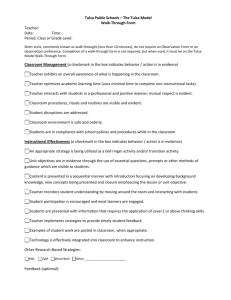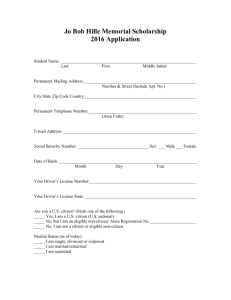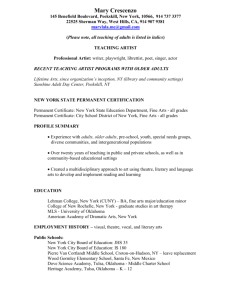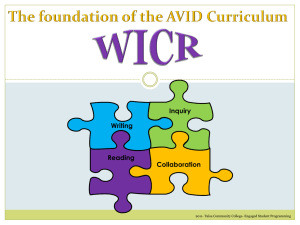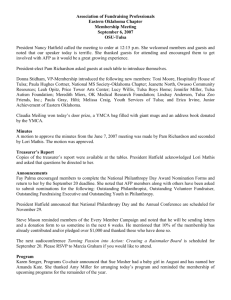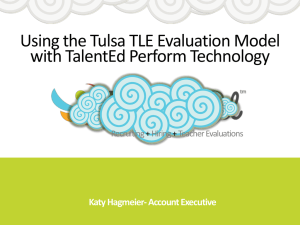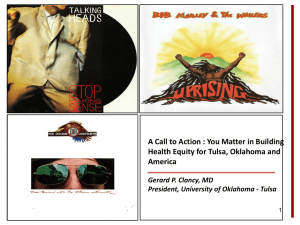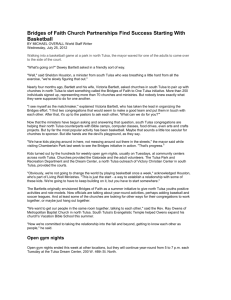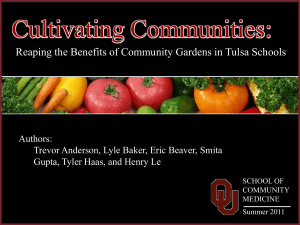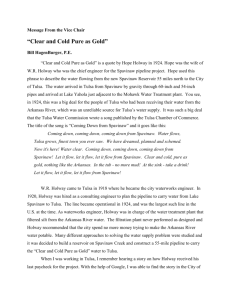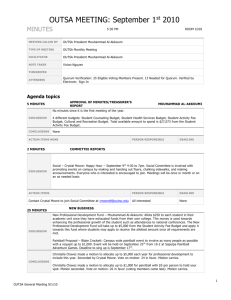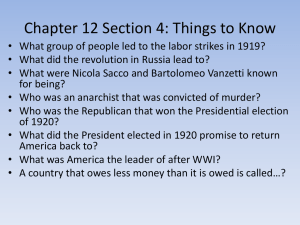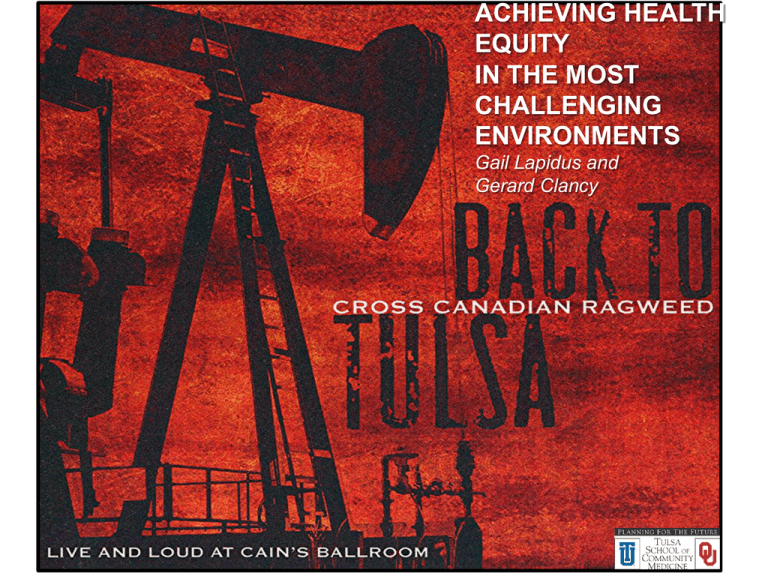
ACHIEVING HEALTH
EQUITY
IN THE MOST
CHALLENGING
ENVIRONMENTS
Gail Lapidus and
Gerard Clancy
Hubris
• Extreme haughtiness, pride or arrogance.
• An overestimation of one’s own competence or
capabilities, especially when one is in a position of
power….
• Rufus Fears: OU Classics Professor – “outrageous
arrogance that inflicts suffering upon the innocent.”
• My Introduction to Tulsa Health Care….
Healthcare leader, 2002 - “ I don’t know why we are
here today meeting on this…we have the best health
care in America right here in Tulsa.”
Billboards and plaques
Commonwealth Fund 2012
Commonwealth Fund 2012
Probability of late vs. early diagnosis of
cancer, uninsured compared to those
with commercial insurance, 1994
Prostate
cancer
1.5
1.4
Breast cancer
2.6
Melanoma
Colorectal
cancer
1.7
0.0
1.0
2.0
3.0
Source: Roetzheim, et. al., 1999; KFF Chartbook
Individuals without insurance are 1.4 to 2.6 times
more likely than the insured to be diagnosed with
last versus early stage cancer.
Commonwealth Fund 2012
News Flash – We Knew This in 2006
14
14
In a nation short of physicians, Oklahoma starts the furthest
behind of all States in building an adequate health system.
Ranking of States by Primary Care Access-Challenge Index
Our Founding Fathers had a hand in
what you are feeling right now….they
set a moral high ground for us
today….
“We hold these truths to be self evident,
that all men are created equal, that they
are endowed by their creator with
certain inalienable Rights, that among
these are Life, Liberty and the pursuit of
Happiness.” Thomas Jefferson
–
–
–
–
France – Liberty, Equality, Fraternity
Germany – Unity, Justice and Freedom
Australia - Life, Liberty and Prosperity
George Kaiser – “with what we now
know, to not act is morally offensive.”
Advancing the moral high ground
•
•
•
•
•
•
•
•
1776 – Declaration of Independence, Representation
1861 – Civil War, Liberty and Slavery
1870 – 15th Amendment, Voting Rights Race
1920 – 19th Amendment, Voting Rights Sex
1935 – Social Security Act, Retiree Protection
1964 – Civil Rights Act, Segregation
1965 – Voting Rights Act, Voting Rights Race
1965 – Social Security Amendments, Medicare and Medicaid –
Federal Sponsorship of Health Care Coverage
“may you live in interesting times”
• 2009 – American Recovery and Reconstruction Act (Stimulus)
• 2010 – Patient Protection and Affordable Care Act (ACA)
• 2012 – Supreme Court Upholds ACA
– Oklahoma – faces greatest challenges of all.
– will we choose to ….cover 250,000 uninsured oklahomans through
medicaid expansion…..will we take advantage of opportunities to
reshape our sick health care system?
ACHIEVING HEALTH EQUITY IN THE
MOST CHALLENGING ENVIRONMENTS
1. Critical thinking
–
–
Study the problems. Be Honest About What is Not Right.
“To achieve health equity, Learning the anatomy of the community is
as important as learning the anatomy of the body.” a summer institute
central theme
2. Critical communications
–
Be able to persuade multiple audiences including peers, politicians
and the media.
Talk less and Listen more….
–
•
“Listen to the Patient, he is telling you the diagnosis.”
osler
•
a white coat ceremony oldie but goodie
“Listen to the community, she is telling you the problems and the solutions.”
a summer institute central theme
3. Critical emotions
–
Experience It…feel it…overwhelmed passionate.
4. Critical actions
–
–
sir william
“Get Busy Livin’ OR GET BUSY DYIN’ ”
Gail Lapidus takes on mental illness…
Critical Thinking - Tulsa’s Disparities In Health:
- 14 year difference in life expectancy North vs. South.
- North, East and West Tulsa; 40% of population, 4% of Docs
Age-Adjusted Death Rate in Tulsa
Physician Density in Tulsa
19
19
Critical Communications: “Is
Tulsa North Being Pimped by
OU?” January 2010
“To Tulsa north’s ‘rescue,’ Oklahoma University has come. Unquestionably, medical care is
needed in Tulsa north. Why then, pose such a negative question when OU appears to be
doing the right thing?”
“Our answer….Pimps use the bodies of women to make money. For whatever reason, the
women are vulnerable. The residents of Tulsa north are very vulnerable because of their
poor health outcomes. Hundreds of millions of dollars will be spent ostensibly for better
health care for Tulsa north residents. Who gets the money for such an endeavor? OU
will. Who receives $20 million dollars for building the facility? Manhattan Construction
has been selected as the contractor.”
“If a healthy community is the goal of OU, does it not recognize that a healthy community
involves more than improving traditional healthcare facilities and services? A healthy
community must have a good economy and a chance for good jobs for its residents.
Tulsa north’s personal sense of well-being and its ability to thrive socially and
economically are tied together. It is impossible to have a healthy community without a
strong educational and economic engine in its midst.”
“Why do we pose the question, “Is Tulsa north being pimped by OU?” Do not pimps use
bodies to get income? OU will receive income from treating sick bodies. When will OU
learn that the elimination of healthcare disparities among population groups is not a zero
sum game?”
20
Nation’s greatest
concentration of:
- Untreated major mental
illnesses
- Open drug dealing and drug
abuse
- HIV, Hepatitis and STDs
- Trauma
Blue Print for a School of Community Medicine: Every effort focused on improving the health of entire
communities with special attention on our most vulnerable populations. These efforts visible in many forms…..
Pipeline Development and Recruitment:
• Partnerships with Carver middle
school, McLain high school, Booker T.
Washington high school
• Cherokee Nation partnership
• Undergraduate college scholarships –
Rogers State, Cameron State,
Southeastern State universities.
• Area Health Education Centers –
rebuild for Oklahoma with HRSA
• TU undergraduate programs
• Loan pay-back program for service –
GKFF
• Merit scholarships – GKFF
• Physician Manpower Training
Commission – loan and practice set up
financial aid
• National Health Service Corp FQHCs
Admissions – Unique Identifiers:
• SCM track – admissions subcommittee
• Admissions criteria – demonstrated
commitment and track record in
service, demonstrated critical thinking,
critical communications and critical
application of knowledge and skills
Community Building in Areas of Poverty:
• 36th Street North – Tisdale Clinic
construction by local talent, Tisdale
Clinic employment, City of Tulsa Small
Area Planning, Early Childhood
Education – Educare, Educareers
• Improved Public Education – Teach For
America, Doctoral Programs in
Education Leadership, TU School of
Urban Education
• Healthy Schools – Fitness in Education,
School-based Clinics.
• True Blue Neighbors – revitalized KW
“Critical Action”
Inquiry: Roots of Vulnerable Populations:
• Laureate Institute for Brain Research –
genetic, imaging and neuro-psychology
determinants of mental illness.
• Science of of Adverse Environments, Tulsa
Children’s Project
• Integrative Immunology – role of
immunology and environment in medical
and mental diseases.
Curriculum Unique Identifiers:
• Starts with Summer Institute for 1st year
students – introduction to the anatomy of
the community
• Poverty Simulations
• PRESENTATIONS (Calgary) Model of
Curriculum
• Masters and Certificates in Public Health
Options
• Ethics and Social Justice
• Competence in Caring for the Poor
• Team Care – Team Leadership – Student
Led Patient Centered Medical Homes
• Medical Informatics training
• Populations Management
• Systems Engineering Skills
• Interdisciplinary Learning – medicine,
nursing, pharmacy, public health, social
work, human relations, urban design, law,
engineering, informatics and more.
Innovations in Health System Design for Efficient – High Quality
Care Across the Community including Care of the Poor:
• Student Led Free Clinics for the uninsured
• Bedlam Evening Acute Clinic
• Bedlam L – Chronic Care Clinic
• Pentaho management of patient groups
• Patient Centered Medical Homes
• Contracts with Medicaid and Blue Cross – Blue Shield
• Direct to Business Primary Care
• Williams Company, Union Public Schools, OU – Physicians
University of Tulsa
• Sport Medicine – TU, ORU, High Schools
• Outreach Primary Care
• School Based Clinics – Kendall Whittier / Educare, Rosa
Parks, Roy Clark, Sand Springs
• FQHCs – Morton PA Clinic, Community Health
Connections, Indian Health Resource Center
• High Risk Populations
• PACT Team – Serious Mental Illness
• Palliative Care Team – Chronic / Severe Medical Illness
• Heart Intervention Project – at Neighbor for Neighbor
• Pediatric Diabetes Team
• High Risk Obstetrics Outreach
• Child Abuse Network – Justice Center
• Fostering Hope Clinic – medical home for children in
foster care
• Youth Services – Homeless youth outreach
• Addition Medicine Program
• Tisdale Clinic – urgent and specialty care in underresourced zip codes
• Regional Health Infrastructure Redesign and Leadership
1. Patient Centered Medical Home Partnerships with OHCA, BC / BS
2. Care Coordination – Health Access Network contract with OHCA
3. Comprehensive Primary Care Initiative – multi-payor primary
care collaborative.
4. Duals (Medicaid and Medicare eligible) Planning Grant funded
through Center for Medicare and Medicaid Innovation
5. Beacon Communities Health Information Exchange Grant –
Funded through Federal Office of National Coordinator

